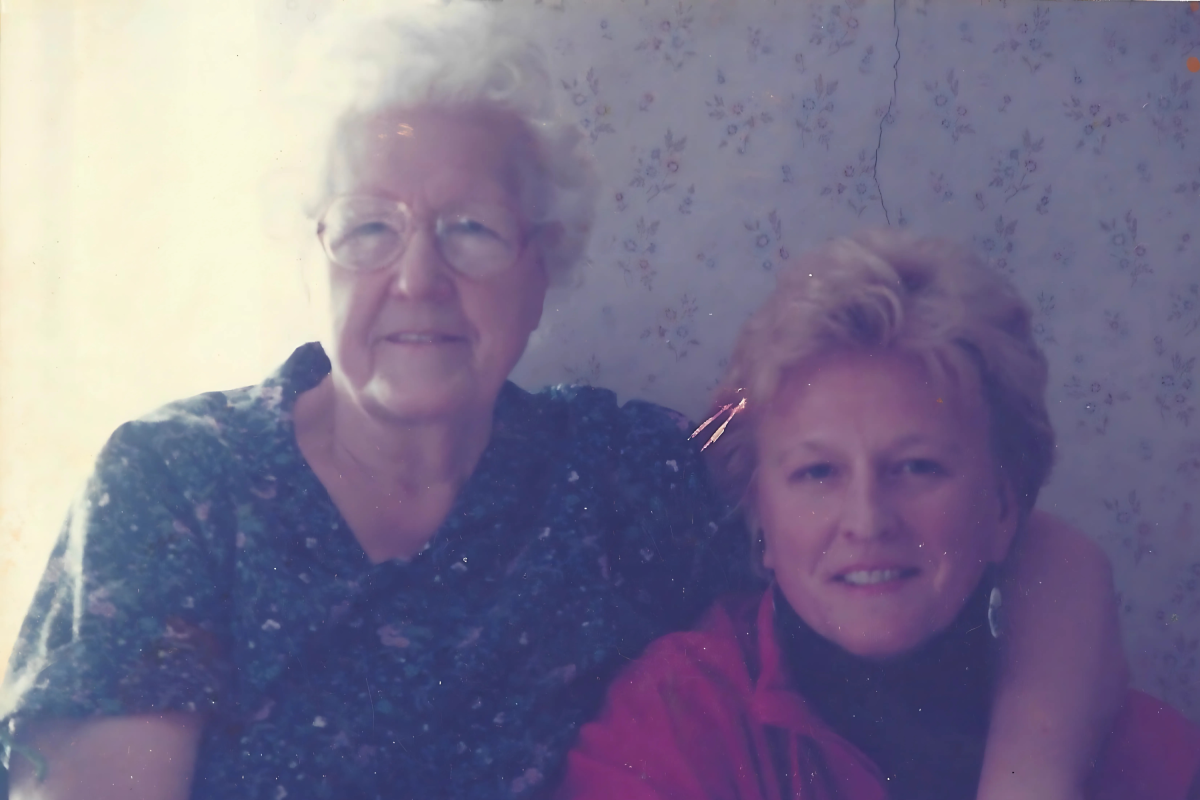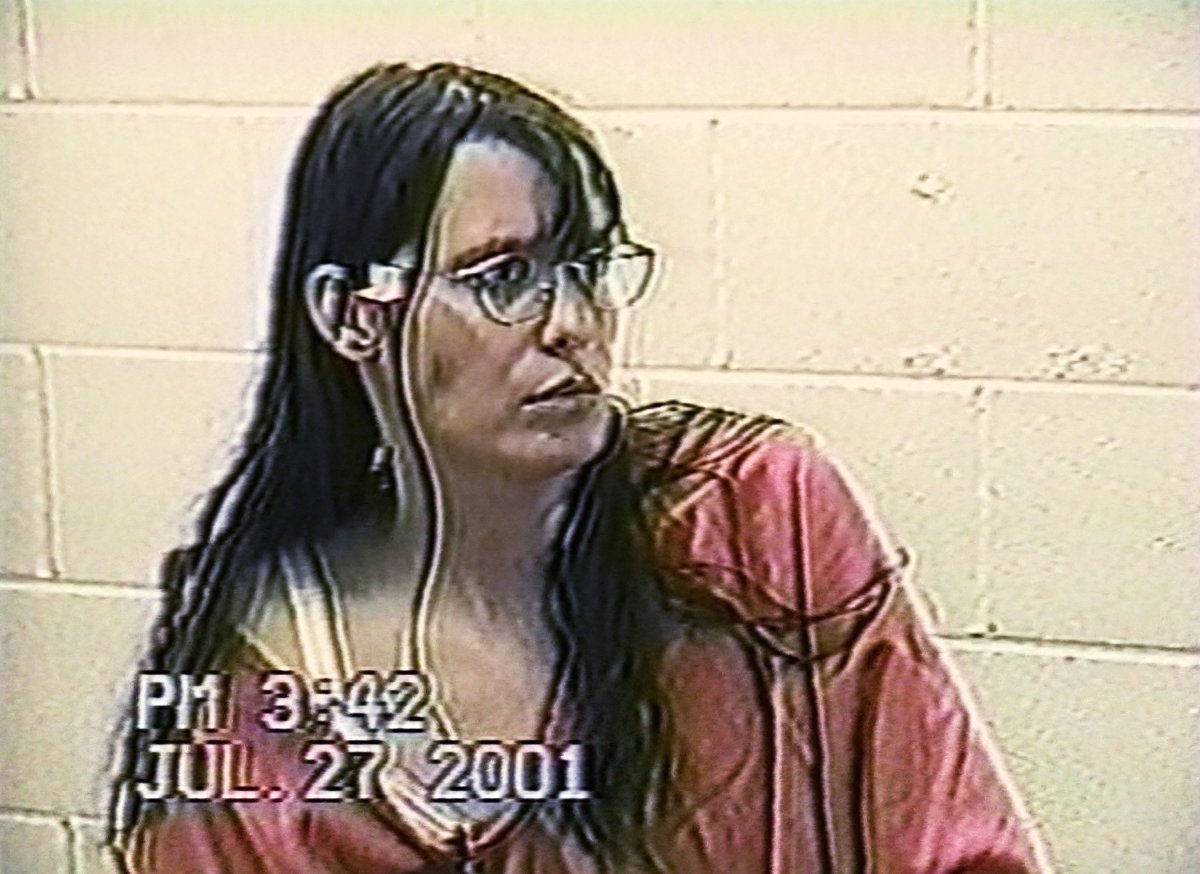A violent menopause. That was the country phrase my mother used to describe her prolonged illness almost immediately following my birth on the winter solstice of 1948.
It was an expression shrouded in mystery; a period of her life she would sometimes refer to but never discuss, although fragments of her well-guarded secret occasionally slipped through.
But the nonverbal message about this period in her life had always been clear—the detached gaze, the anguish in her voice, whenever she mentioned that phrase.
Decades later, I'm just beginning to understand the magnitude of what my mother actually faced—postpartum psychosis—a rare postpartum illness most chillingly distinguished by the impulse to kill one's offspring.
My mother, Jenny "Gertrude" Vermillion, was born in 1907 in Youngstown Ohio, the eldest of five girls.
Her childhood was filled with financial insecurity and disruption, attending seven different schools in Ohio, PA, and NY before her 13th birthday, when she withdrew to help support the family.
It must have been a tremendous loss for Mom who loved her school days and excelled as a student, especially in math. She always said her only true regret in life was that she couldn't finish her education. Gertrude was also a self-taught pianist and exceptional vocalist.
Mom was a very tall, attractive, confident woman, known for her outspokenness, storytelling, and resounding laughter. She married my father, Lawrence Bayer, in 1934 during the Great Depression.
They began their life together with just ten dollars in a rented decrepit coal company house with land that they gardened in the tiny, close-knit Southwestern Pennsylvania community of Ginger Hill.
Mom treasured her network of neighbors, but after 14 years, they were pulling up roots and moving to their own farm in another tiny SW PA community, Eighty Four. It was winter and they were moving, not just a household, but an entire farm.
But there were far greater complications.

Mom was eight months pregnant. Forty years old and already the mother of four boys, another pregnancy was a predicament she had desperately wanted to avoid. Believing God determined such things, she accepted His will.
The stress in Gertrude's life intensified when on moving day, a delegation of women from the local Presbyterian church dropped by.
Rather than coming to welcome their new neighbors, the women were there on a fact-finding mission: "Would my parents be attending the Pigeon Creek United Presbyterian Church?"
When Mom said they would attend a Catholic Church instead they left abruptly, one of them delivering the Word of God herself: "Well then, you won't have any friends around here."
Just six weeks later my mother gave birth to me on winter solstice. But rather than marking the return of light to her world, it marked the onset of a prolonged darkness that she called a violent menopause.
I was in my late 40s when Mom finally disclosed the symptoms of her illness. It was during a weekly visit. Somehow, Gertrude raised the topic. Without even thinking, I said: "Mom, what exactly happened to you?" The floodgate opened.
It was a Sunday morning several weeks after my birth. The family, except Mom and me, were at Church. From "out of the blue," she started feeling shaky; the room began to darken; she was restless.
She tried to keep busy. She decided to go outside. It was winter. She took me with her. She started having strange thoughts. The worst thought of all was that she needed to kill me.
The bad thoughts kept coming. For the remainder of the time until the family returned, my mother fought the impulse to kill me. It was only an hour or so, but she said it felt like an eternity.
When they returned, she immediately told my father what had happened. He grasped the gravity of the matter, tried to reassure her that everything would be OK, but said until then she needed someone with her.
His own stress must have been enormous: A new baby, other children, the crushing workload and financial worry of a new farm, and his wife with the impulse to kill their newborn.

Within several months my mother lost 80 pounds. She described long stretches of anxiety and paranoia. Her violent thoughts continued.
I was never left alone with her. She worried constantly when her other children were at school. She felt unsafe. She experienced visual delusions when riding in a car and could no longer drive.
Although Gertrude had suffered from insomnia since the birth of her first child, it worsened. She slept little and would often need to wake my father in the middle of the night and they would go outdoors to sit.
In true country fashion, Gertrude "doctored with the chiropractor." Her weekly treatments went on for years. It was the only medical intervention she received.
My father, a man with only a second-grade education, found the fortitude to support my mother through these years of what they both believed was the result of a violent change of life triggered by my birth. Lawrence was a very quiet man known for his patience.
Following her recovery, Gertrude said others disclosed their worry that she "wouldn't make it." The severity of her illness must have been apparent.
Twenty years earlier I had been part of a research team studying schizophrenia. Although my specific task was non-clinical, I had an understanding of psychosis and its torment.
While I clearly heard the psychotic dimension of Mom's illness, I initially labeled it as postpartum depression; I was then unaware that something called postpartum psychosis even existed.
That remains the case today, even for many mental health professionals.
With the exception of any prior mental illness, Mom was a textbook case of postpartum psychosis: Restlessness, disordered thinking, paranoia, panic, auditory and visual hallucinations, and most dangerously—voices and thoughts about needing to kill your baby or yourself.
Even though most new mothers (about 75 percent) experience the "baby blues" and 10 to 15 percent of new mothers experience a more serious postpartum depression, less than one percent of all mothers' experience postpartum psychosis.
When treated, most women do recover within a year through hospitalization, medication, and therapy. Tragically, when untreated, an astonishing four percent of postpartum psychotic mothers kill their offspring.
It was not until 2001 when Andrea Yates, suffering from an untreated postpartum psychosis, drowned her five children that any national awareness of this rare illness began to emerge. Much more is needed.
After years of interviewing family members living with schizophrenia, I had a sense of the profound anguish and pain inherent in psychosis. It is its own particular hell.
When I realized that my mother had lived through a severe, rare psychotic disorder, I was shocked again. I felt deep compassion for the gravity of her suffering. I began to understand my family system and myself differently.
I read stories at least once a year about women with postpartum psychosis who kill their offspring. Without great faith and my father's unwavering support, my mother could have been one of these stories.

Russell Yates believed his wife's mental illness resulted from her inability to resist the Devil. The Bible study group they held several evenings each week was perhaps a source of support for her.
But she was still floridly psychotic and left alone with her children during the day while her husband was at work.
Psychiatric interventions she did sporadically receive were grossly inadequate marked by instances of extremely poor diagnosis, treatment, and premature discharge for insurance reasons.
My mother believed her unrelenting anxiety and even thoughts of killing me were caused solely by the biology of menopause.
The greater psychological turmoil disrupting her life, including an unwanted pregnancy and fractured social network, didn't figure into the equation she used to explain her experience. But that was 75 years ago.
An ultimate taboo, disclosing the impulse to kill one's child must be an unthinkably painful admission. My mother told no one but my father.
When a new mother does commit infanticide, even if floridly psychotic, she is regarded unforgivingly and without compassion.
I recall the news photos of Andrea Yates, long before I realized my own mother's illness.
Photographed in her prison uniform, Yates was an obviously sick and deeply distressed woman; I wondered how her suffering would intensify when her psychosis abated and the ultimate horror of her actions took hold.
Yates called herself "the most hated woman in America" betraying the inevitable magnitude of her own suffering.
I imagine, like my own mother, Andrea Yates was deeply devoted to her children. It's comforting to hear her ex-husband call for compassion towards her, something that perhaps with more knowledge, we will find.
I will always feel my mother's love. And, abiding compassion for the horror she felt about harming me.
Trudy Bayer is an educator, writer, and political activist who resides in the city of Pittsburgh with her fantastic partner of 30 years. She was the founding director of the oral Communication Lab at the University of Pittsburgh. This essay is part of a larger memoir about her experiences growing up during the 1950s on a farm in rural Southwestern Pennsylvania.
All views expressed are the author's own.
Do you have a unique experience or personal story to share? See our Reader Submissions Guide and then email the My Turn team at myturn@newsweek.com.
About the writer
Trudy Bayer is an educator, writer, and political activist who resides in the city of Pittsburgh with her fantastic partner ... Read more



